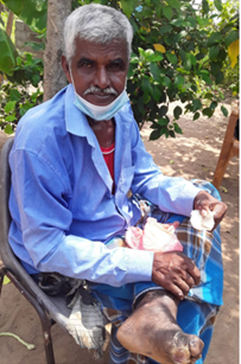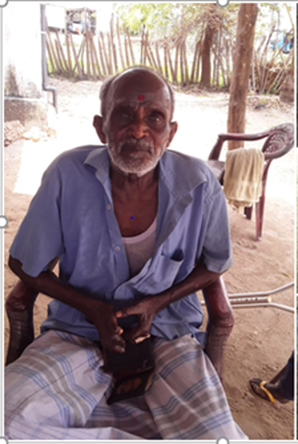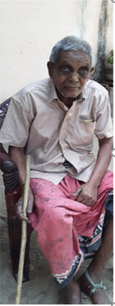Providing support for life in Sri Lanka
The Manthivu Leprosy Centre was established in 1921 and is funded by SFLG. The doctors and sisters based there treat and support people with leprosy. The centre was taken over by the government in 1960 but the sisters still carry out vital outreach work supporting leprosy sufferers and their families in a variety of ways. Their selfless work ensures that those with leprosy are not abandoned when they have nowhere else to turn.
The Manthivu Leprosy Centre was established in 1921 and is funded by SFLG. The doctors and sisters based there treat and support people with leprosy. The centre was taken over by the government in 1960 but the sisters still carry out vital outreach work supporting leprosy sufferers and their families in a variety of ways. Their selfless work ensures that those with leprosy are not abandoned when they have nowhere else to turn.
|
Kannpathipillai (70, lives at home)
Kannpathipillai was a 50-year-old brickmaker, married with three children, when he noticed a swelling in his leg. Fluid began leaking from it, and he decided to seek help when he found walking increasingly difficult. A hospital doctor diagnosed leprosy. Kannpathipillai was very worried as he wanted to continue providing for his family. During treatment, the infection spread to his hands, and he eventually had two toes and two fingers amputated. As well as treatment, the centre built Kannpathipillai a proper toilet in his house. Sisters from the centre continue to visit him regularly, and their “Love, concern and encouragement is a great support’. Although he is now cultivating land, he can no longer make bricks, so relies on the centre to provide some economic support. He hopes they will continue to support his cultivation or buy him some goats. |
what I would like the world to know about leprosy is not dangerous infection as in the early days. We have better treatments to stop the spreading of the bacteria. So I would like to say that if you get any symptoms kindly attend to a doctor as soon as possible in order to stop the spreading.
|
Kanapathipillai (78, lives at home)
At 30 years old and married with five children who relied on him, Kanapathipillai was working as both a farmer and a fisherman. He developed pink patches all over his body, and began losing sensation in his legs. After a leprosy diagnosis, he began treatment, but suffered from large wounds and a lot of pain. Kanapathipillai was very worried about his wounds and sickness, and also about what others would think of him. As well as treatment, the centre has been a wonderful ongoing support for him and his family. They built them a house with a toilet, and visit regularly to provide medicine, rations and occasionally financial help. Before this help, Kanapathipillai had considered taking his own life, but states “because of the support and help of you all I am still alive and enjoying my being. I am much more grateful to each one of you,” Four of his five children are now married, but his 40-year-old daughter who lives with him suffers with depression. Though Kanapathipillau feels reassured that the centre will support her and provide her with a home once he has died. |
Kanapathipilla said, “what I would like the world to know about leprosy is that now it is nothing to be fear of. If you detect it early it can be cured completely. Please treat leprosy patients with dignity. Do not abandon them. I would like to tell their family members, relatives and friends to understand them and do not put them aside or reject them. Be kind to them and treat them equally”.
|
Antiyappan (71, lives at home)
At 25, Antiyappan was living happily with his wife and two children, and working as a gardener. He began to experience patches and numbness on this legs. He found it increasingly hard to walk, so sought the help of a hospital doctor. During treatment, the patches on his legs turned to wounds. Antiyappan was not so worried for himself but terrified that the leprosy might spread to his wife and children. His worse fear came true when his wife developed symptoms – thankfully, she was also cured. The centre also helped by building them a house, and along with rations, providing ongoing medicine. He is so grateful for their care and concern, and thanks God for the sisters at the Centre. Antiyappan’s wife is a thyroid patient and his son-in-law has been treated for kidney failure. He continues to worry for his family, but hopes that his daughter and her children will live securely and receive a good education. He could not have held these hopes for their future were it not for the centre. |
Antiyappan said, "if anyone notices a patch on his or her body which is not normal please attend to a doctor. Early treatments can cure the leprosy. If we all can do so, then the leprosy will be vanished from the world very soon. And also never to get frighten and hide it can worst the situation”.






